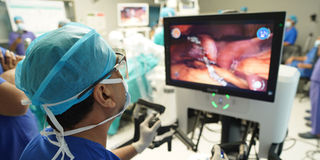Tanzania, Apollo Hospital enter into partnership on robotic cancer surgery

Robotic surgery is the newest way of treating cancer. PHOTO | FILE
What you need to know:
- Tanzania and India’s Apollo Hospital have partnered in exploring the possibility of incorporating robotic surgery in cancer treatment in the country with the aim of reducing patient harm and admission periods
Dar es Salaam. Tanzania and India’s Apollo Hospital have partnered in exploring the possibility of incorporating robotic surgery in cancer treatment in the country with the aim of reducing patient harm and admission periods.
The advanced technology, already widespread in developed nations, is being explored by the Ocean Road Cancer Institute (ORCI) to enhance cancer care.
The President of the Tanzania Society of Oncologists, Dr Jerry Ndumbaro, highlighted the benefits of robotic surgery, saying the launched method utilises specialised radiation to target and destroy cancer cells in confined areas without traditional surgical procedures.
Speaking during a recent symposium, he said the launched technique is particularly advantageous for cancers located deep within the body, such as those in the brain and lungs.
“Technological advancements now allow us to treat patients with fewer complications. Tanzania is currently utilizing computed tomography (CT) scans and linear accelerators for modern treatments, but we have yet to reach the robotic stage,” he said, reiterating the need for awareness and training in new medical technologies.
A radiation oncologist from Apollo Hospital, Dr Susheela Sridhar, acknowledged Tanzania's progress in modern cancer treatments, emphasising the importance of capacity building and training for the implementation of robotic surgery.
“Robotic surgery is efficient; patients typically spend only five days in recovery before going home,” she stated.
ORCI executive director, Dr Julius Mwaiselage, said reiterated on the seminar’s role in fostering collaboration between Tanzanian specialists and Apollo Hospital experts.
He mentioned that participants gained insights into modern cancer treatment techniques that minimise side effects, including traditional chemotherapy and innovative approaches like immunotherapy.
“We are moving towards more targeted cancer treatments, which represent a significant advancement in our capabilities,” he explained.
Apollo Hospitals’ representative in Tanzania, Mr Alex Audax, highlighted the partnership with the Ministry of Health and local cancer treatment centers.
“We provide surgical care and guidance for patients, facilitating communication and collaboration between Tanzanian doctors and our specialists,” he said.
The seminar also provided Tanzanian specialists with training in robotic radiation treatment, with plans for some to undergo further training at Apollo Hospitals in India for three to six months.
This collaboration marks a significant step forward for cancer treatment in Tanzania, paving the way for more effective and less invasive therapies in the region.





